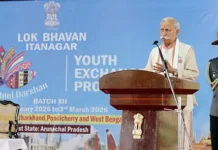RONO HILLS, 8 May: Legislative Assembly Speaker Tesam Pongte called for a “vigorous revival”of the state’s traditional shamanic chanting languages- “linguistic strands that bind tribal communities to their land, rituals, and cosmologies.”
He said this after inaugurating a two-day Sanskrit orientation workshop titled ‘Sanskrit and Sanskriti: Unearthing the Repository of Knowledge in the Traditional Indian Knowledge System’, organised by the Centre for Online and Distance Education (CODE), Rajiv Gandhi University, in collaboration with the Institute of Open and Distance Education at Central Sanskrit University, New Delhi, here on from 7 to 8 May.
Pongte said, “These tongues are more than mere vehicles of communication; they enshrine our collective memory, our myths of origin, and our covenant with nature.”
He painted a vivid picture of how each chant, each ritual song, carries encoded knowledge of medicinal plants, seasonal cycles, and ethical frameworks unique to Arunachal’s myriad tribes. He cautioned that failure to document, teach, and pass on these chanting traditions could sever Arunachal’s communities from their ancestral wisdom, triggering irreversible cultural loss.
Drawing parallels to the nationwide revival of Sanskrit, in which dedicated institutions, curricula, and community-led initiatives have sparked a renaissance, Pongte urged all present to forge partnerships between universities, local elders, and youth groups. “Let us harness the blueprint of Sanskrit’s resurgence – its peer-tutoring circles, immersive language camps, and digital archives – to craft a renaissance of our own shamanic chants,” he added.
Earlier, RGU Registrar Dr NT Rikam in his address stated that “without Sanskrit, there is no sanskriti,” and suggested that the successful revival strategies for Sanskrit be applied to preserve Arunachal Pradesh’ indigenous languages and oral traditions before they vanish.
The programme’s convener, Moyir Riba, outlined the workshop’s objectives and celebrated its synchronicity with the national 1008 Sanskrit Sambhashan Shivir Abhiyan by Sanskrit Bharti. “This orientation marks RGU’s unwavering commitment to cultivating Sanskrit learning nationwide,” she said, terming the event a pivotal milestone in the broader mission to elevate Sanskrit as a living linguistic treasure.
In his keynote address, Kumar Bhaskar Varma Sanskrit & Ancient Studies University, Nalbari, (Assam) Vice-Chancellor Prof Prahlad R Joshi reminded the attendees that “Sanskrit is woven into the very identity of Arunachal Pradesh.” Citing seven villages where Sanskrit remains the primary spoken language, he urged the participants to view Sanskrit not as an archaic relic but as a vibrant medium capable of enriching modern discourse.
Further, a panel discussion on ‘The Need for Sanskrit Education in the Context of Arunachal Pradesh’, convened four distinguished scholars to explore both the historical trajectories and contemporary imperatives of Sanskrit learning in the region. Prof Prahlad R Joshi traced the language’s illustrious past and examined its sharp decline following Macaulay’s 1835 Minute, arguing that reviving daily Sanskrit fluency could enrich Arunachal’s multilingual environment and open new avenues for research in philosophy and environmental ethics.
RGU Hindi HoD Prof Oken Lego surveyed how Hindi’s rise has fostered statewide literary expression- citing local poets and playwrights whose Hindi works spotlight tribal narratives – and proposed targeted certificate courses in collaboration with Central Sanskrit University to create career pathways in teaching, translation, and digital media.
RGU Hindi Department Assistant Professor Dr VK Mishra offered a deep dive into the structural elegance of Sanskrit grammar, detailing how 19th-century logicians like Charles Babbage and Hermann Grassmann were drawn to Panini’s formalised rules as precursors to algorithmic thinking, and highlighted modern computational linguistics research leveraging Sanskrit’s fixed morphology to improve language-processing models.
Over 200 participants, including scholars, students, and cultural enthusiasts from RGU, Vivekananda Kendra College of Teacher Education (VKCTE) Nirjuli, and Oju Mission School, Naharlagun took part in the workshop.


